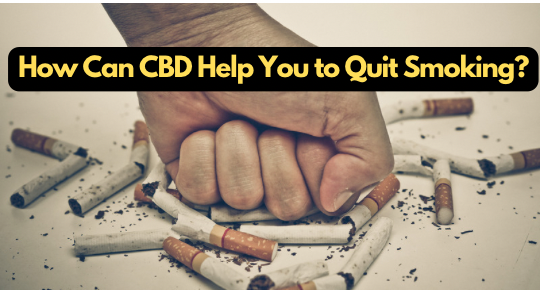
How Can CBD Help You to Quit Smoking?


Can You Use CBD Oil to Quit Smoking Cigarettes?
Understanding how nicotine addiction works is paramount if you want to find an effective solution. Aside from the obvious physical addiction, smoking cigarettes is habit-forming and thus can trigger behavioral addiction.
With a physical addiction, all you need to do is endure the time your body needs to flush nicotine out of your system and bring your body back to normal functioning.
Behavioral addictions are more complex because the brain of an addicted person is wired to certain processes that often lead to the pleasurable sensation associated with inhaling cigarette smoke.
That’s why nicotine replacement therapies such as nicotine gums or patches demonstrate low cessation success rates.
Imagine engaging in a particular activity 20 to 40 times a day for 10 to 20 years; won’t it be hard to quit that habit regardless of the activity?
The surge of dopamine combined with an effortless way to experience it — as is the case with smoking cigarettes — further reinforces the habit, making it more difficult to go cold turkey.
Below we explain how CBD may help you curb cigarette cravings, dampen withdrawal symptoms, and rewire your brain so that it no longer associates smoking cigarettes with a priority.
 How CBD Oil May Help You Quit Smoking Cigarettes
How CBD Oil May Help You Quit Smoking Cigarettes
CBD has a versatile therapeutic profile. People use it to relieve a wide range of conditions and symptoms, including pain, muscle spasms, tremors, seizures, sleeplessness, autoimmune conditions, neurodegeneration and dementia, and more.
Recently, CBD has garnered the attention of psychiatrists and addiction experts for its potential in dealing with tobacco addiction.
Here we explain how using CBD oil can help you quit smoking cigarettes.
1. CBD Alleviates Withdrawal Symptoms After Quitting Cigarettes
Nicotine is strongly addictive, similar to hard drugs like cocaine, hence quitting smoking cigarettes. At some points, most users face a barrier of withdrawal symptoms that is almost impossible to overcome.
Physical addiction to tobacco reaches far beyond the urge for another cigarette. Withdrawal symptoms develop within a few days and involve irritability, anxiety, difficulty falling asleep, high blood pressure, headaches, and depression.
They may linger for up to several weeks. If the period of withdrawal were easy to overcome, smoking addiction wouldn’t become a global health problem.
CBD interacts with the human endocannabinoid system (ECS), which maintains homeostasis throughout the body. The ECS controls essential bodily functions, including sleep cycles, stress response, blood pressure, body temperature, mood, memory, pain perception, and more.
CBD is a potent inhibitor of FAAH — an enzyme that breaks down the body’s natural endocannabinoids. These endocannabinoids bind to cannabinoid receptors in the brain (CB1) that can influence mood, pain, sleep, and reward regions in your brain. Supplementing CBD oil helps you maintain a sufficient level of your own cannabinoids and thus reduces the dysfunction of the aforementioned processes.
2. CBD Curbs Tobacco Cravings
A 2018 study that came out of the UK in May 2018 investigated the potential benefits of CBD on smoking-related behavior. This double-blind, randomized study included a sample of 30 addicted smokers. Each of the participants was taking 800 mg of CBD orally or an equivalent dose of a placebo.
Then the subjects were shown “pictorial tobacco cues” such as drinking, parties, other people smoking, etc., and were analyzed for heart rate, cravings, blood pressure, and withdrawal symptoms.
The authors concluded that a single 800 mg dose of CBD could help to reduce the “pleasantness” of images associated with smoking cigarettes compared to the placebo group, especially for the participants who only went through one day of cessation for the study.
3. CBD Eases Anxiety After Quitting Cigarettes
On top of regulating the ECS, CBD uses over 60 molecular targets to interact with the body, which explains its therapeutic versatility.
One of these targets involves the modulation of the GABA receptor to balance the levels of two neurotransmitters: glutamate (excitatory) and gamma-aminobutyric acid (inhibitory). High levels of glutamate and low levels of GABA are associated with the hyperactivity of the brain and increased feelings of anxiety. By modulating the GABA receptor, CBD helps to maintain equilibrium in your nervous system, , improving stress response, and enhancing focus.
CBD also acts on the serotonin receptor. Serotonin is the neurotransmitter responsible for mood and emotions, whose low levels are linked to anxiety and depression. In contrast, excess serotonin levels in the brain can induce muscle spasms, overactive reflexes, shivering, clumsiness, and tremor.
Although CBD doesn’t directly boost your serotonin levels, it blocks its reuptake by interacting with the 5-1HTA serotonin receptor so that your brain can use it more effectively. This, in turn, translates into the proper functioning of brain cells and thus helps to relieve tremors, muscle spasms, and even lowers the incidence of anxiety and depression.
4. CBD Reduces Cigarette Consumption
One study examined smokers who wanted to quit smoking cigarettes. Each smoker was taking an inhaler with either CBD or a placebo vaping cartridge. The participants were asked to use the inhalers every time they felt the urge to smoke. At the end of this week-long study, the CBD group showed a 40% reduction in cigarette consumption while the placebo group didn’t report a significant difference in the number of cigarettes smoked.
The study authors concluded that this effect could be attributed to CBD’s indirect interactions with CB1 receptors. Not only does CBD increase the natural level of anandamide — one of the two major endocannabinoids known as “the bliss molecule,” but it can also mitigate the boosting properties of nicotine.
In a research paper posted in the journal Addiction, Hindocha et al. went on a series of experiments in which vaping cannabis was associated with reduced tobacco consumption. The research team hypothesized that:
“There could be a reason to be optimistic about the potential of vaporizers. If vaporizers can reduce cannabis and tobacco co-administration, the outcome could be reducing tobacco use/dependence among cannabis users and a resultant reduction in harms associated with cannabis/tobacco. Indeed, if vaping cannabis becomes commonplace in the future, the next generation of cannabis users might never be exposed to nicotine or tobacco in the first place.”
 How to Use CBD to Stop Smoking
How to Use CBD to Stop Smoking
As you can see, CBD can do a lot to help you quit smoking cigarettes. But how do you take CBD to get the best results for your nicotine addiction? Here are a few tips that can make it easier:
Buy High-Quality Products
The source of your CBD oil can make or break your experience with using CBD to quit smoking cigarettes.
Make sure the brand you’re looking at ticks off the following points:
- The hemp source: prioritize brands with in-house organic hemp fields in the US and Western Europe. Avoid products sourced from mass-produced hemp imported from overseas, as this kind of hemp is often contaminated with pesticides, heavy metals, and synthetic fertilizers.
- The THC content: the concentration of THC in your CBD oil must be less than 0.3% to be considered legal on a federal level. Any product with a higher THC content is treated by federal law as marijuana and thus prohibited unless your state has legalized marijuana for recreational use.
- Lab reports: it’s always better to choose a company that provides certificates of analysis (COAs) for their products. These certificates give you insight into the product’s phytochemical profile, including the THC content and purity levels.
 Start with a Low Dose
Start with a Low Dose
If you’re looking for a straight answer, we don’t have good news for you. Since CBD hasn’t been yet clinically tested for tobacco addiction, there are no established dosage guidelines on this subject; you can get a quick point of reference by looking at the studies that have examined the efficacy of different doses of CBD for quitting cigarettes.
Another reason why dosing CBD in humans isn’t that obvious is the number of individual factors at play. The list includes an individual’s weight, metabolism, unique body chemistry, the severity of addiction and withdrawal symptoms, and the potency of your CBD product.
Consulting a medical practitioner experienced in using CBD for addiction should help you establish the optimal starting dosage. We recommend starting with a low dose, like 10-15 mg per day to see how your body responds to cannabidiol. If this works for you, you can begin taking more to assess what amount reduces the salience of tobacco stimuli.
 Opt for Full-spectrum CBD Oil
Opt for Full-spectrum CBD Oil
Full-spectrum CBD oil contains all beneficial compounds that naturally occur in hemp plants, including CBD, adjunctive cannabinoids, terpenes, and trace amounts of THC. These ingredients work together to amplify each other’s health benefits while mitigating potentially unwanted reactions (e.g., in a way, CBD counteracts the psychotropic effects of THC).
This phenomenon is known as the entourage effect — the reason why full-spectrum CBD products are the most desired type of CBD. Several studies have found that full-spectrum CBD oils overcome the bell-shaped dose-response when people take pure cannabidiol — meaning that dosing is more predictable with such products.
If you’re concerned about the trace amounts of THC, you can choose a broad-spectrum extract, which only contains CBD, terpenes, and adjunctive cannabinoids — but without the intoxicating compound.


Article Source: https://cfah.org/cbd-oil-for-quitting-tobacco/
